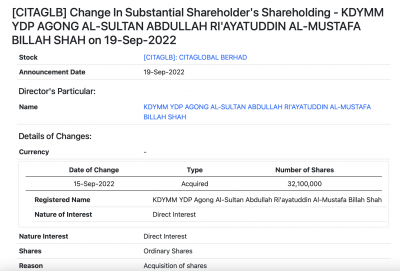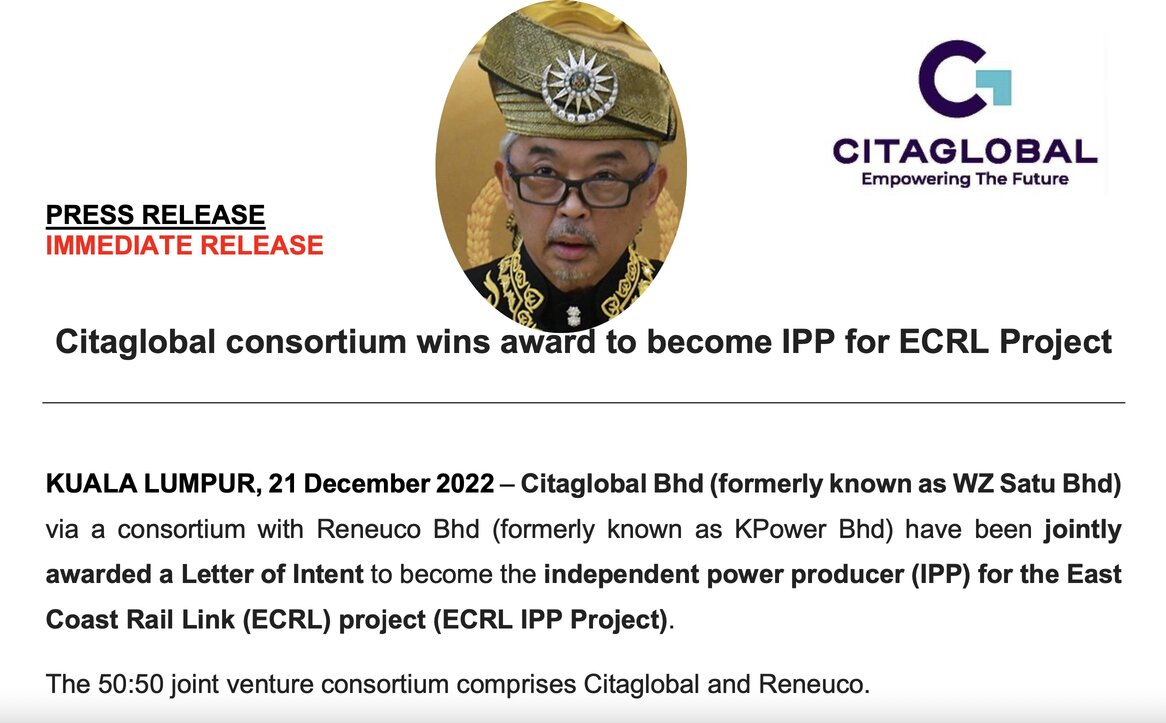The Sultans of Malaysia are well known for their enthusiastic engagement in business activities, particularly through family members, which are undertaken alongside their powerful decision making roles.
It makes for a huge advantage when seeking a licence or contract, of course, to have as one of the shareholders in the enterprise someone who holds a powerful influence over the body that controls the concession!
Such opportunism has long raised eyebrows, especially given that these heads of state are already handsomely maintained through taxpayers’ money. However, there are those who still adopt a feudalistic notion that somehow each state ‘belongs’ to the royal families concerned, despite the arrival of modern property ownership and constitutional statehood several generations back.
In this fashion protected forests have been de-gazetted and parcelled out for destruction to companies that have been predominantly connected to royal concerns. Likewise, there have been numerous instances where lands assigned to lessees by the state or preserved as customary native areas have been snatched and ‘developed’ to the advantage of royal families who have become obscenely rich in recent decades, whilst little has been done to improve the lives of so many inhabitants of their states.
Rules about what royals can get up to in their own states in this respect are arguably vague, although the quid pro quo for a salary and expenses is usually that you don’t engage in money making activities at the expense of your boss, particularly through making decisions where your interests conflict with theirs.
However, in the case of the federal role of the Agong the constitution is absolutely clear. Article 34 .3 states “The Yang di-Pertuan Agong shall not actively engage in any commercial enterprise” nor should he, according to the previous clause, “hold any appointment carrying any remuneration”.
The Australian based writer on Malaysian affairs, Ganesh Sahathevan, has drawn attention to this point, along with the related sequence of events with respect to an announcement by the Ministry of Finance, just two days after the Unity Government took office, of the award of a lucrative IPP contract for the controversial East Coast Railway Link. The winner was a 50:50 joint venture between Citaglobal Bhd and Reneuco Bhd.
In its early stages the so-called ECRL project became a scandalous vehicle by which the former prime minister, Najib, now convicted for corruption, raised billions by inflating contracts to Chinese construction companies to cover up his losses from the 1MDB fund which he had looted. The entire project was suspended after the Harapan government took office in 2018 until the contracts were revised.
In this latest development it is clear from public documents that, under the former PN government, the MOF owned entity in charge of the ECRL (Malaysia Rail Link Sdn Bhd) issued a request for proposals to provide for the ‘independent power provider’ contract for the railway in March. Submissions were due by May and it can be surmised the above JV was a contender.
Following this Sahathevan has noted that an announcement was made in September that the Agong increased his shares in the public listed Citaglobal Bhd from a 9% stake to a hefty 12.4%, having bought out the majority of his cousin Uzir Tengku Ubaidillah’s holding in the company – which had been sizeable enough to earn Tengku Ubaidillah a position on the board.
The Tengku and another cousin, Indera Zubir Tengku Ubaidillah (who had also surrendered a lesser shareholding at the same juncture) both took this moment to step down from the board.

This acquisition therefore took place during a time that the public listed company with a strong history of royal connections in terms of its major shareholders was under consideration for a major federal contract.
During the following months, as Malaysians know, there was considerable political disruption as the PN/BN coalition government first delivered a major budget and then immediately after announced it would dissolve and call an early general election which took place on November 19th.
The outcome of the election was far from clear cut, given the PH coalition received the most votes but not an overall majority, which led to a month of horse-trading during which the Agong played an active and interventionist role urging parties finally to concede to the new prime minister Anwar Ibrahim’s leadership of the new ‘Unity Government’.
Anwar appointed himself simultaneously Minister of Finance and was confirmed after a vote of confidence was passed in parliament on December 19th. Two days later on December 21st Citaglobal announced it had together with Renuoco won the contract for the ECRL IPP as awarded by the MOF.
It has been observed that so far there has been no price put on the value of the contract but Citaglobal, whose shares are controlled by a small handful of significant shareholders, reassured that “We are grateful and honoured to have won this national contract via a competitive bidding exercise.”
It is however observable that the head of state was personally acquiring a larger interest in the company at a time when political leaders whose future could be seen to depend on his support were confronted with making decisions about this contract.
A job for a proposed new ‘Ethics Advisor’ to structure the affairs of the Agong so he is more plainly distanced whilst in office?

